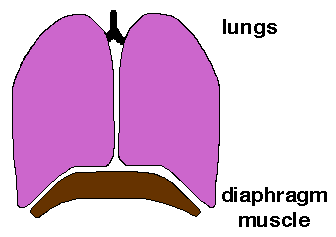Created by Susan Stagg-Williams, Dieter Andrew Schweiss, Gavin Sy, and H. Scott Fogler, 1994
Updated by Apeksha Bandi, Gustav Sandborgh, and Arthur Shih, 2013
The Layperson's Guide to Human Respiration

People tend to take their breathing for granted--it's just something that
you do. If I were to ask you to take a breath, you could consciously
control your breathing, but as soon as your mind began to wander, your
body would take over for you again. (Which is good news for you, since
if you stop breathing, you'll die!) But what really happens when you
breathe?
Well, if you think back to your high school biology class, you'll recall
that your lungs are like a bellows in the way they draw air into your
body and exhale it out again. But your lungs are useless without your
diaphragm muscle, which does the pushing and pulling on your lungs to
make them work. So when you take a breath, your brain sends an
electrical impulse through your nervous system to your diaphragm
muscle, telling it to do its thing, but what is "its thing?"
When the order to breathe arrives at your diaphragm muscle, the nerve
endings that surround the muscle are triggered and they release
chemical signals for your diaphragm. These chemical signals consist
of acetylcholine molecules, which are released from
transmitter sites in the nerve endings. The acetylcholine
molecules bind to receptor sites on the individual fibers of your
diaphragm muscle. (A transmitter/receptor pairing is known as a
synapse.)

When enough of these chemical signals are received by your muscle fibers,
they will stimulate your entire diaphragm to contract and then relax.
During relaxation, the acetylcholine molecules bound to receptor sites will
break down and vacate the receptor sites they occupied, so that the
contraction/relaxation cycle can start again. This happens every time
you take a breath.
(If this watered-down explanation of breathing wasn't enough for you, then
check out a more-detailed explanation
of the mechanism of human respiration.)